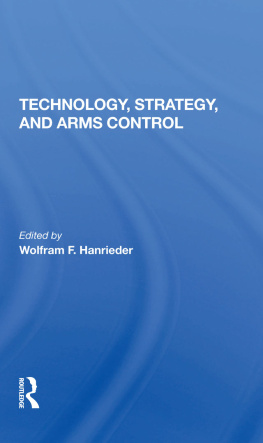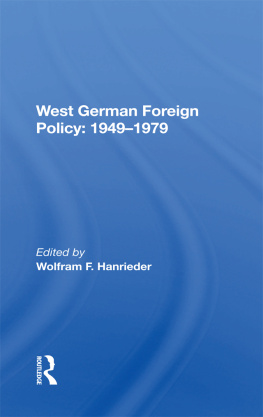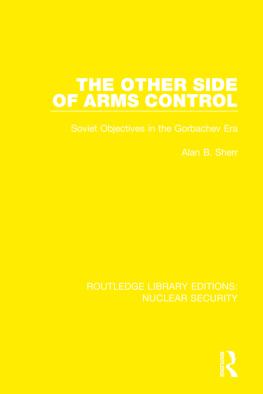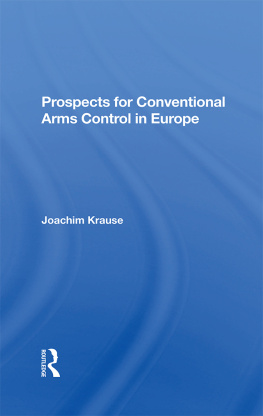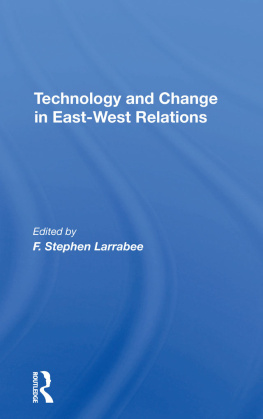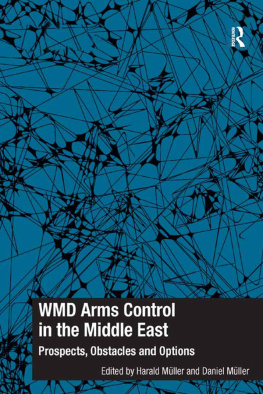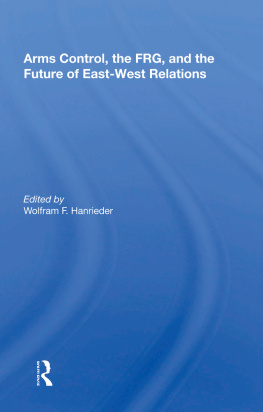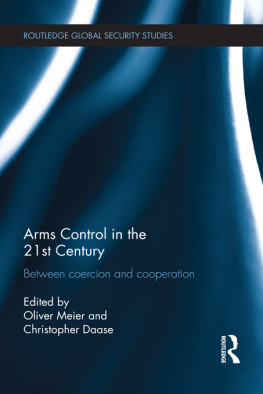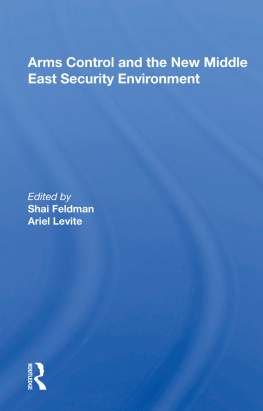TECHNOLOGY, STRATEGY, AND ARMS CONTROL
Also of Interest
Nuclear Strategy, Arms Control, and the Future, edited by P. Edward Haley, David M. Keithly, and Jack Merritt
Nuclear Non-Prolifration: Congress and the Control of Peaceful Nuclear Activities, Robert L. Beckman
Nuclear Past, Nuclear Present: Hiroshima, Nagasaki, and Contemporary Strategy, Ian Clark
A Strategy for Terminating a Nuclear War, Clark C. Abt
The Environmental Effects of Nuclear War, edited by Julius London and Gilbert F. White
Soviet Nuclear Weapons Policy: A Research Guide, William C. Green
The Soviet Union and Strategic Arms, Robbin F. Laird and Dale R. Herspring
Nuclear Arms Control Choices, Harold Brown and Lynn E. Davis
Toward Nuclear Disarmament arid Global Security: A Search for Alternatives, edited by Burns H. Weston with the assistance of Thomas A. Hawbaker and Christopher R. Rossi
Conflict and Arms Control: An Uncertain Agenda, edited by Paul R. Viotti
Global Nuclear Energy Risks: The Search for Preventive Medicine, Bennett Ramberg
Atoms for Peace: An Analysis After Thirty Years, edited by Joseph F. Pilat, Robert E. Pendley, and Charles K. Ebinger
Arms Control and International Security, edited by Roman Kolkowicz and Neil Joeck
International Security Yearbook 1984/85, edited by Barry M. Blechman and Edward N. Luttwak
Avail able in hardcover and paperback.
About the Book and Editor
Focusing on the most urgent issues of arms control, this collection of essays discusses the East-West military balance, the nature of U.S.-Soviet relations, the political dynamics of developments in weapons technology, the problems that conflicting national security policies pose for the management of the Western alliance, the influence of U.S. domestic politics on the prospects for arms control, and the efforts to enhance the prospects of peace through peace research. The political, technological, and ethical dimensions of the arms race and of arms control efforts are examined against the background of their historical development in the postwar period and analyzed with a view toward enhancing the prospects for a less volatile military-strategic environment and a more stable international political order. Together these original essays provide a comprehensive overview of the possibilities for and limitations of restraining and managing nuclear issues in the 1980s and beyond.
Wolfram F. Hanrieder is professor of political science at the University of California, Santa Barbara. He is the editor of Helmut Schmidt: Perspectives on Politics (Westview, 1982); Arms Control and Security: Current Issues (Westview, 1979); West German Foreign Policy, 1949-1979 (Westview, 1979); and (with Larry Buel) Words and Arms: A Dictionary of Security and Defense Terms (Westview, 1979).
Technology, Strategy, and Arms Control
edited by Wolfram F. Hanrieder
First published 1986 by Westview Press, Inc.
Published 2019 by Routledge
52 Vanderbilt Avenue, New York, NY 10017
2 Park Square, Milton Park, Abingdon, Oxon OX14 4RN
Routledge is an imprint of the Taylor & Francis Group, an informa business
Copyright 1986 Taylor & Francis
All rights reserved. No part of this book may be reprinted or reproduced or utilised in any form or by any electronic, mechanical, or other means, now known or hereafter invented, including photocopying and recording, or in any information storage or retrieval system, without permission in writing from the publishers.
Notice:
Product or corporate names may be trademarks or registered trademarks, and are used only for identification and explanation without intent to infringe.
Library of Congress Cataloging in Publication Data
Main entry under title:
Technology, strategy, and arms control.
Essays based on lectures delivered at the University of California, Santa Barbara, Program in Global Peace and Security.
1. ArmamentsAddresses, essays, lectures. 2. Arms raceHistory20th centuryAddresses, essays, lectures. 3. Arms controlAddresses, essays, lectures. 4. National securityAddresses, essays, lectures. I. Hanrieder, Wolfram F.
UA10.T4 1986 327.1'74 85-17861
ISBN 13: 978-0-367-28979-9 (hbk)
Contents
, Herbert F. York
, Paul C. Warnke
, Jonathan Dean
, Wolfram F. Hanrieder
, Richard Ned Lebow
, Robert A. Hoover
, Kurt Gottfried
, Ernst-Otto Czempiel
, Bishop Thomas J. Gumbleton
The essays collected in this anthology are based on lectures delivered at the University of California, Santa Barbara (UCSB), during the academic year 1984-1985. The lectures were part of the newly established Program on Global Peace and Security, through which UCSB seeks to augment its existing academic programs with a public dialogue on some of the most pressing problems that stand in the way of achieving a more peaceful and just world order. The primary purpose of this program is to enable our undergraduate students to complete their formal major by pursuing an organized plan of study concerning global peace and security issues and to help them examine these issues from a variety of perspectivesfrom different academic disciplines, from different political orientations, and from the points of view of different parts of the world. Beyond that, the program aims to reach a wider audienceon and off campusand foster the reasoned discussion of problems that affect, directly or indirectly, our daily lives and local communities, although their origins and possibilities for solution may be distant in both time and place. Arranging for a series of public lectures, and publishing the essays that resulted from them, is part of this effort.
Avoiding nuclear war is the most urgent task of our age. For this reason, the lectures during the program's first year focused on issues of the East-West military balance, its technological and political dynamics, and its implications for national security policy and arms control. But we do not intend to define the issues of peace and security narrowly. The central theme for the program's second year will be "World Peace and the International Economic Order," in order to address such topics as the North-South conflict, global and regional trade and monetary regimes, and the role of international organizations in strengthening the economic and sociopolitical foundations of peace and security.
It is a pleasure to acknowledge the generous support the Program on Global Peace and Security has received from Dr. Eulah C. Laucks, president of the Laucks Foundation of Santa Barbara; from Provost David Sprecher, UCSB; and from Professor Herbert York, University of California, San Diego, director of the University of California Institute for Global Conflict and Cooperation. Last but not least, we wish to thank our student participants in the program for the sense of excitement and enthusiasm they have brought to our common endeavor. It is to them that this book should be, and is, dedicated.
Wolfram F. Hanrieder
Santa Barbara, California
1
U.S.-Soviet Negotiations and the Arms Race: A Historical Review
HERBERT F. YORK
A historical review of the negotiating positions of the United States and the USSR in several major arms control areas suggests that each side has special and serious problems in dealing with the other. Why is it so hard for the United States and the USSR to negotiate mutually beneficial arms control agreements? The question arises most pointedly in light of the failure of the first Reagan administration to achieve progress on arms controla failure that I shall not deal with here specifically as it is covered in many of the subsequent chapters. But it applies as well to other attemptspast, present, and futureby the two superpowers to resort to direct diplomatic means to moderate the arms race and help reduce the chances of nuclear war. In my view there are certain important idiosyncrasies in the negotiating positions of both parties that make it particularly difficult for them to reach such agreements. To show what I mean I shall first take a look at the preferred format for arms limitation, the treaty; then deal with arms limitation through unilateral actions; and finally review the historical background of several major lines of arms control negotiations. In so doing I shall draw in part on my experience as a participant in such sessions, particularly in the latest round of the longest-running nuclear-arms control discussions of all: the sporadic twenty-five-year-old effort to achieve a comprehensive ban on nuclear-weapons tests.


